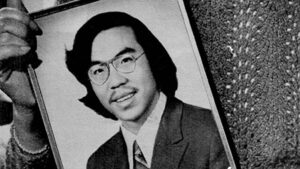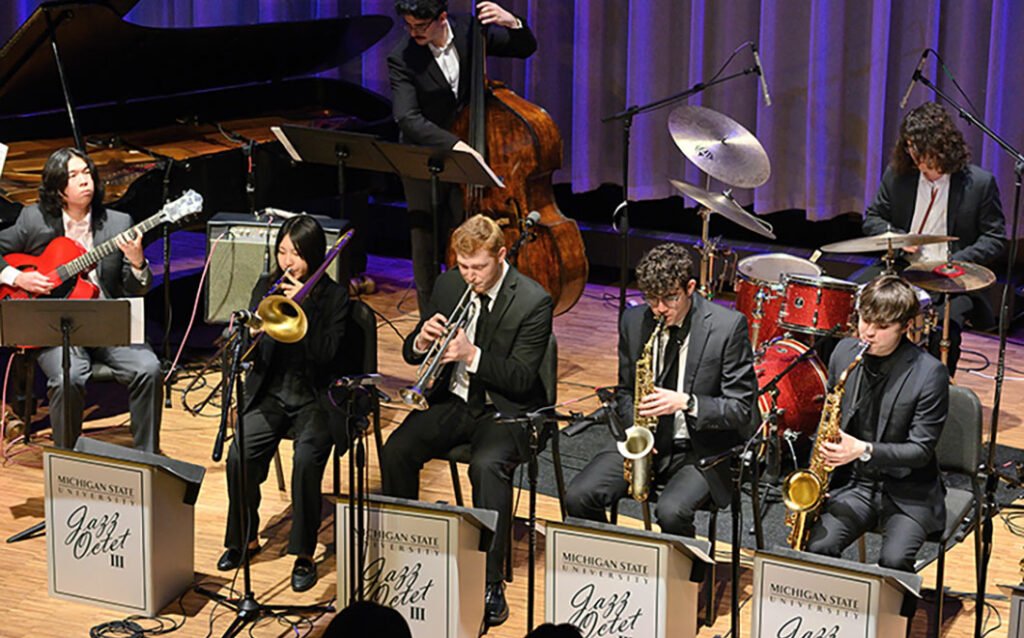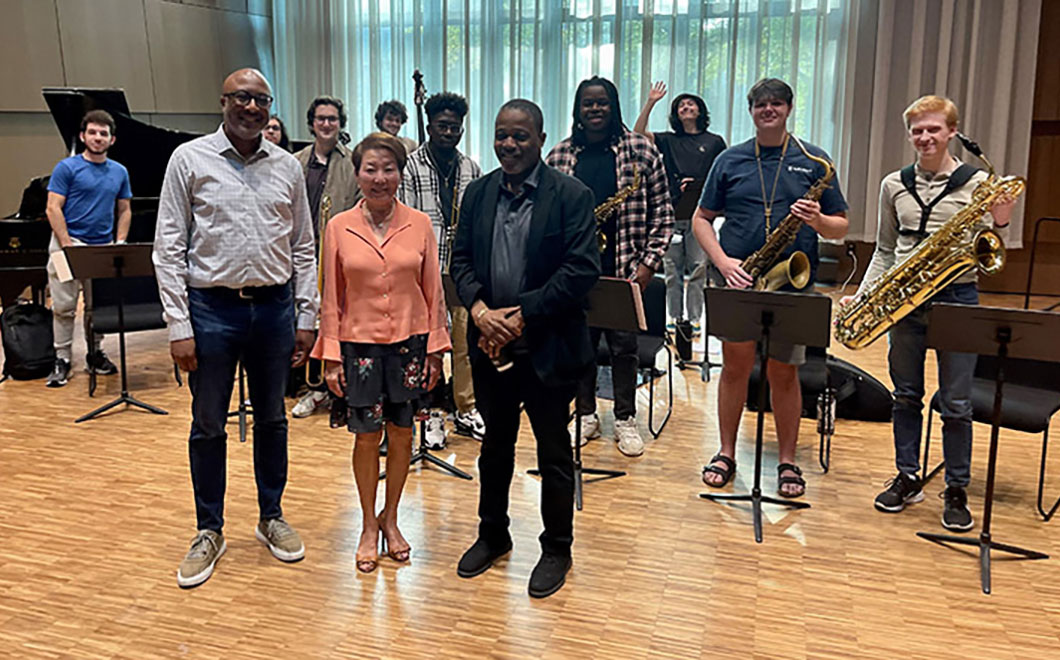
In addition to Jazz Nonet sponsorship, Jenny Chung funded Student Organization Project Awards to support student-led human rights initiatives.
For a long time, Jenny Chung considered herself part of a silent majority. Now, that is changing.
Chung sponsored the entire 2023-24 season of performances by the Michigan State University Jazz Studies Nonet ensembles I and II. She separately funded Student Organization Project Awards to support student-led human rights initiatives.
Chung has challenged ensemble members to use their performances to raise awareness about the importance of human rights in our community and create initiatives focused on human rights and diversity, and inclusion in the College of Music.
“The first time I met with each group, I very frankly told them that I have high hope in them because they’re so talented, they’re young, and enthusiastic about what they want to achieve,” Chung said. “Most importantly, I said, ‘I am endorsing you because I want to make you my ambassadors to the community for human rights.’ They seemed happy and encouraged to hear that.”

Jazz saxophonist Steve Harvey was murdered in a Kansas City park following a gig in 1980. Though Jenny Chung would not hear of this hate crime until much later, it moved her to take action and tie her generous giving to his memory.
Bringing her to this point is Chung’s personal story of family struggles, terrible abuse, and an urge to do something positive but feeling helpless. She went through years of introspection, and little by little she developed the courage to speak out about her beliefs. In addition to her own life, two tragedies helped shape her thinking.
The first was in 1982 when a Chinese American man named Vincent Chin was out with friends in Detroit. That night, two white men – who apparently thought Chin was Japanese – beat him to death. Targeted for his perceived ethnic background, Chin did not get justice as each man received only a fine with no prison time at the state level. He received delayed justice when the U.S. Department of Justice decided to try the defendants on hate crimes.

The tragedy of Vincent Chin, a Chinese American man murdered in Detroit in 1982 due to his ethnicity, also moved Jenny Chung to years of introspection that led to her courage to speak out.
Many years later, Chung read the story of the killing of highly regarded jazz saxophonist Steve Harvey in a park in Kansas City in 1980. Harvey, who was black, encountered a white man who was in the park with two friends. Their goal was to harass others. They chased Harvey and beat him to death with a baseball bat.
By the time Chung learned about the Harvey tragedy, she was nearing retirement. Her thoughts were evolving on what is most important to her, and she and her husband had also become fans of jazz music, attending MSU and other jazz events.
“Fairness and justice are very important to me,” she said, “and I feel that if we don’t have that, we might as well not be human beings, right? And then the question is, how did we get to this point right now? Where is the fairness? Everywhere you look, there is more human suffering. Then ask yourself, ‘How come I’m so lucky?’”
Which is why she dedicated her sponsorship of the MSU Jazz Nonets to the memory of Steve Harvey. While much delayed and symbolic, it is a gesture of justice, and by shining a light on his story, she hopes to urge people to think about this issue and how to mutually respect each other’s humanity and human rights. This message resonated with jazz students and faculty when she met with Nonets I and II last fall.

The MSU Jazz Nonets have been inspired by Jenny Chung’s message that they are her ambassadors for spreading the message of human rights. One student referred to Chung as “one cool lady.”

Jenny Chung and her husband, Dr. Daniel Reed, love jazz and traveling. Seen here in Capri, they are loyal supporters of MSU Jazz Studies.
“Jenny Chung is a natural fit for our community,” said Associate Professor of Jazz Guitar and Associate Director of Jazz Studies Randy Napoleon. “She deeply values human rights and dignity. She is hip and has a great sense of humor. The students found her very relatable and relevant. The feeling of jazz is based on a cry for equity, and she is pursuing the same basic goals as we are in our music.”
Jazz bassist and MSU Jazz Studies master’s student Sofia Rabiela agreed. She said there was an energy shift in the room when they heard Chung speak.
“We all realized that this means a lot to her, and it is our duty to make others feel the way she made us feel,” Rabiela said. “The weight of what this funding means hit all of us. Our collective mindset changed after that. We, as a nonet, are comprised of so many diverse backgrounds, and the opportunity to make a difference toward a common goal really brought us together as people, musicians, and advocates. The thing most of us said after our meeting was, ‘I can’t wait to play this music on the tour,’ and ‘That is one cool lady.’”
Indeed, she is. While working as assistant director of information systems for the State of Michigan Department of Treasury, Chung founded the first two Kumon method education locations in Michigan in 1990. Eventually, she left the state position and ran the Kumon business for 28 years before selling the franchise in 2018.

Jenny Chung founded the first Kumon educational centers in mid-Michigan, and she has enjoyed traveling during her retirement, which has also allowed her time to reflect on what is most important to her. Speaking out for those unjustly treated is very important to her.
Born in China, Chung comes from a family of scholars and decorated military leaders. The communist regime overtook the government her family defended, forcing them to flee to Taiwan, penniless and heartbroken. Her mother did not have many education opportunities, nonetheless she realized how important education would be for her daughters. She borrowed money to help send Chung to the United States. Chung first worked in California for a few months to repay some of her mother’s debt, just like all her siblings.
She then earned a scholarship to study at MSU, completing all required graduate credits for a master’s degree in plant pathology but did not pursue the degree because she decided she was more interested in business than science. A resident of Holt, Michigan, now retired, her success in business is admirable especially considering she began it as a divorced mother following an extremely difficult 17-year marriage.
“When I was young, I had to train myself how to handle the bullies,” she explained. “I would look in the mirror and practice how I should calmly tell them to stop it. Although I was timid when was a teenager, if I saw somebody bully another child in front of me, I will fight for that child. I will, somehow, get my voice louder, pretend I am not fearful, and I will try to give justice to that person. So, that part has been very important to me, even since I was young.”
She believes that all the hardships and difficulties she experienced have taught her valuable lessons in how to navigate her life, and they have also helped her become a better person with more empathy and kindness.
Her support of Jazz Nonets I and II took on added significance for the faculty and students when working with Detroit jazz artist Vincent Chandler on music commissioned through Chung’s gifts. Chandler, a trombonist, was a guest at the College in November. His compositions, “Reaching for the Stars” and “Kansas City Dreamer,” honor the memory of Steve Harvey, the saxophonist, and were performed by the MSU Jazz Nonets this year.
“’Reaching for the Stars,’ and Ms. Chung, are our reminders that we are storytellers, ambassadors, advocates, and humans,” Rabiela said. “Every time we play the song it almost takes the breath away, from us as performers and the audience, because it carries a different weight of importance in our hearts. The energy in the room shifts as if Mr. Harvey was playing alongside us.”
Chung, who likes to “stick up for the underdog,” said that in retirement, with more time to think, she had an epiphany. She has always been part of the silent majority, on the side of people who care and hope for things to be better but do not speak up or act.
“Hatred and anger are cancers of the mind, and I believe that when people harbor anger or hatred in their hearts, not only is it dangerous but it can also be deadly,” she said. “The silent majority does not have a voice, and that thought crystallized my feelings and spurred me into action. I want to have a voice. I want my voice to be heard. and I want my voice being used in the most profound way to bring justice and fairness to everyday life.”
So, with her support of jazz and her commitment to human rights for all, her voice is heard with ambassadors helping to spread her message.
“When I was thinking of taking action to make this happen, I felt profoundly lucky at this point in my life. I am blessed to have the ability to do this. I decided to put my money where my heart is. This is one person’s cry for the society that she loves.”

The Campaign for Michigan State University
Our campaign addresses the most pressing challenges facing the music industry today while increasing our capacity to create lasting positive change and to support student and faculty success.
See Our Campaign Goals









